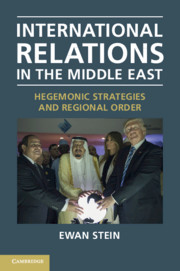Book contents
- International Relations in the Middle East
- International Relations in the Middle East
- Copyright page
- Contents
- 1 Introduction
- 2 The Order of Notables (1919–1952)
- 3 Arab Neutralism and the Cold War (1952–1967)
- 4 Towards a Middle Eastern State Conglomerate (1967–1979)
- 5 Regional Order in Khomeini’s Shadow (1979–1990)
- 6 A New Middle Eastern Order? (1990–2001)
- 7 The Middle East and the Global War on Terror (2001–2011)
- 8 Regional Order after the Arab Uprisings (2011–2020)
- 9 Conclusion
- Bibliography
- Index
4 - Towards a Middle Eastern State Conglomerate (1967–1979)
Published online by Cambridge University Press: 28 January 2021
- International Relations in the Middle East
- International Relations in the Middle East
- Copyright page
- Contents
- 1 Introduction
- 2 The Order of Notables (1919–1952)
- 3 Arab Neutralism and the Cold War (1952–1967)
- 4 Towards a Middle Eastern State Conglomerate (1967–1979)
- 5 Regional Order in Khomeini’s Shadow (1979–1990)
- 6 A New Middle Eastern Order? (1990–2001)
- 7 The Middle East and the Global War on Terror (2001–2011)
- 8 Regional Order after the Arab Uprisings (2011–2020)
- 9 Conclusion
- Bibliography
- Index
Summary
Regional order in the 1970s can be apprehended in relation to three interacting conflict dynamics, which this chapter examines in turn. The first was the competitive support-seeking dynamic between Saudi Arabia and Iran, the latter of which remained Washington’s default partner in the Gulf due to its contiguity with the Soviet Union and apparently greater internal stability. Riyadh’s main asset in this contest was its structural power within a second, Arab–Israeli arena, through consolidating its economic and political influence over Egypt and Syria. Resistance to the stabilisation of this emerging state conglomerate fed into a third conflict dynamic revolving around Syrian and Iraqi ideological externalisation strategies. The hegemonic strategies of each of these states necessitated continued confrontation with Israel.
Keywords
- Type
- Chapter
- Information
- International Relations in the Middle EastHegemonic Strategies and Regional Order, pp. 83 - 109Publisher: Cambridge University PressPrint publication year: 2021



